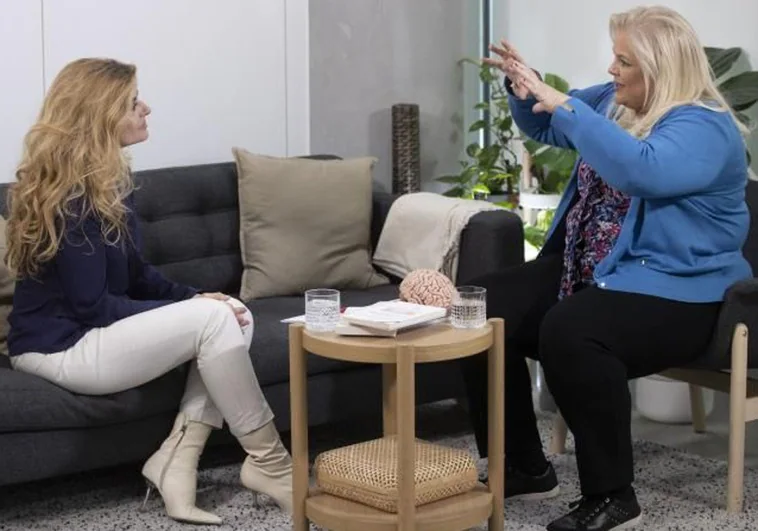Catherine Hofmann is an occupational therapist, specialist in cognitive stimulation and creator of the neurofitness method, a brain training. He explains to ABC that there are a range of tools that can be practiced, even from home, to master our own cognitive management. “We have a lifestyle that is always under pressure: one cannot concentrate, another is stressed and becomes blocked, another reads and has to go back to the beginning because he cannot remember… Neurofitness teaches how You can change situations similar.”
What is the evolution of the brain and how can it be trained from an early age?
I work with pregnant mothers so that they learn that there is already a connection with their baby. We have scientific evidence that our neurons connect to those of our children when they are in the womb. It is important that they know that they need to work on their own condition, because they reflect everything to the baby, even if they do not want to. If they are nervous, the baby will give you a little kick because they feel it.
When he is born, his vision is not yet developed and his brain reacts through stimuli it receives on the skin, the tone of the voice with which we speak… At this stage you have to work a lot with him on touch and hearing .
As he grows, he starts to see visual stimuli, that's why he is shown many things, toys are hung in his crib… because he develops the eye-hand combination more, he sees everything, picks it up and wants to put it down. it in his mouth.
All these stimuli create greater connectivity between your neurons, which marks the experience. What separates a child from an adult is not the number of neurons per se, but the neuronal connections that learning gives you.
When they are two, three, four years old, they are already crawling, talking…, but when they turn five, even six, they enter a very important phase because they are sponges and they learn from everything around them, from what they hear. Your brain needs a lot of stimulation right now. We need to go back to the old days and spend quality time helping them manipulate, playing with pieces, playing dough… and not letting them play with screens.
The neuroplasticity of their brains is amazing and they are constantly learning, but when we give them screens their brains stay hyper-focused on a single spot for hours. Here's the problem.
What exactly is happening to you?
If a child sits in front of a screen for twenty minutes and then switches to another activity, goes cycling, then plays with clay… That's fantastic! But if you spend a lot of time with the screen, the first thing that happens is that you need a fast response time; Secondly, the brain does not work on concentration at all, and thirdly, frustration plays a role, because often, spending so much time with the screen, they get angry because when you take something away from them, you take something away. that stops them. Your brain is healthy. Your brain releases neurochemistry that it thinks is positive because it is already an addiction.
Everything is good, but in balance. We must return to reading, but then to reading on paper and to writing by hand. In my conversations at schools, I strongly insist that screens and paper should be combined, because this is very important for the child's intellectual development.
From the age of six until adolescence, we are in a biological process called “neural pruning”, a concept developed by Don Santiago Ramón y Cajal, which consists in the brain deciding on its own initiative which neuronal pathways to follow (the dendrites). of one neuron connects, in what is called a synapse, with the axon of another). Each neuron can connect to many.
What happens is that when I have a pattern and I'm tied to the tablet, my brain starts to create neural connections associated with that pattern of behavior. But the time comes to prune and the brain says, 'I'm going to keep the routes I've used the most.' Mind you, not the one I like the most, not the one I need the most! And it prepares to prune, as happens with trees, the neural pathways it hasn't used. In this way the personality of that adolescent child is formed. This means that if that child has not had the stimuli because they have not been stimulated with different things, it is very possible that their cognitive development will be affected and they will not get what they really need. Then we start with the labels: this child is not intelligent enough, he is lazy… And it is not like that; It is that that brain has not been able to experience what it really needs.
What do they tell you when you tell schools that a return to paper and a healthy balance with screens is necessary?
At first they look at me like I'm completely crazy. I explain that I have many online training programs for children. In ten minutes I give them a challenge, a technique… I tell them that when they have different areas of learning in different ways, that brain gains mental agility and the best proof is that when they put it into practice, they see that it to work. I've trained hundreds of kids who have gone through this training, from getting straight zeros to A's.
Will parents see it as magic? How is it achieved?
Stimulating the brain so that it knows what to learn. Brain training can be done by anyone at home. The brain needs consistency, spending ten or fifteen minutes every day on an exercise, an activity, depending on what it needs: concentrating, remembering information better, writing without spelling mistakes… It needs a 10 to 15 minute pattern of Monday to Sunday there is no rest here.
I can't expect them to be around for long. At first they get frustrated because they don't understand it, but little by little they get it right. In addition, I teach them to meditate, not to talk or demand from each other, not to compare themselves… And when the child gets into the rhythm, usually within three months, they start to see results.
If a child has the routine every day from the age of four or five to leave their normal routine, their comfort zone and do an exercise challenge every day, for example a meditation, that brain will start to adapt.
Is this method also effective when they reach adolescence and show greater reluctance towards their studies at the ESO or baccalaureate stage?
Complete. Brain training works at any age. The main thing is perseverance and will. We are the sculptors of our own brain.
What would be the keys to encouraging parents with children who lack that perseverance or don't want to study?
If you have a teen who doesn't want to do anything, the first recommendation is for parents to say, “Imagine if you had all the opportunities in the world, what would you want?” Without thinking about what you are good at or not. Some will want to study chemistry even if they think it is impossible. Okay, stop there. What if I told you there are tools proven to achieve what you want? The first thing they do is not believe it. But deep down, when you tell them that it is possible for them to change, they first say no and then they say to you, “Well, by trying I don't lose anything.”
I tell them, “I'm not going to ask you for more than ten minutes a day.” Eventually they realize it themselves. I explain to them that I am their coach and they are my top athlete. He decides where he wants to go: to the Olympics and win gold? I give them the techniques to train them, but they have to do the training. What an athlete works for most is his mind.
Just as there are people in physical sports who say they have a habit, how can we achieve this in these young people in their cognitive development?
Well look, I hook them where it hurts the most, with the things that frustrate them the most. For example, I say to them: 'What bothers you the most? What frustrates you the most? And often it is the case that they sit for hours and discover nothing and cannot tear themselves away from the screens. And I ask him, “What if I give you tricks so that can change?” And when they see that they can maintain that attention, which was previously impossible, they get a great motivation, because if it is really you controlling your brain, that is worth a lot.
To end their frustration, I also ask them, “What would you like to have that you don't have right now?” Many tell me that I need to get better grades, that I need to be better at this, that… So I ask them to choose just one option and I teach them techniques to achieve that, it is what is called 'increasing the cognitive reserve'. I give stimulation to the areas of the brain that it isn't using so that they connect and the brain starts to have a plan B. The great thing is that because the brain is so plastic and so wonderful, it improves. When they see that there is change, they become motivated.
Now you commit to summer school and train your brain in July and August, no holiday breaks?
Disconnecting after completing the course is very important, but you cannot go from one hundred to zero. It will be a disaster when we go back to school in September. I have created a very fun online summer school in which the children receive a ten-minute video every day (with tricks, games, attention exercises, meditations…) and a challenge. That way, when they return to class, their brains will have been active in many areas, without the pressure of an exam. If we work at it, the brain will insist that consistent performance is possible and that returning to the classroom in September will not be expensive.

